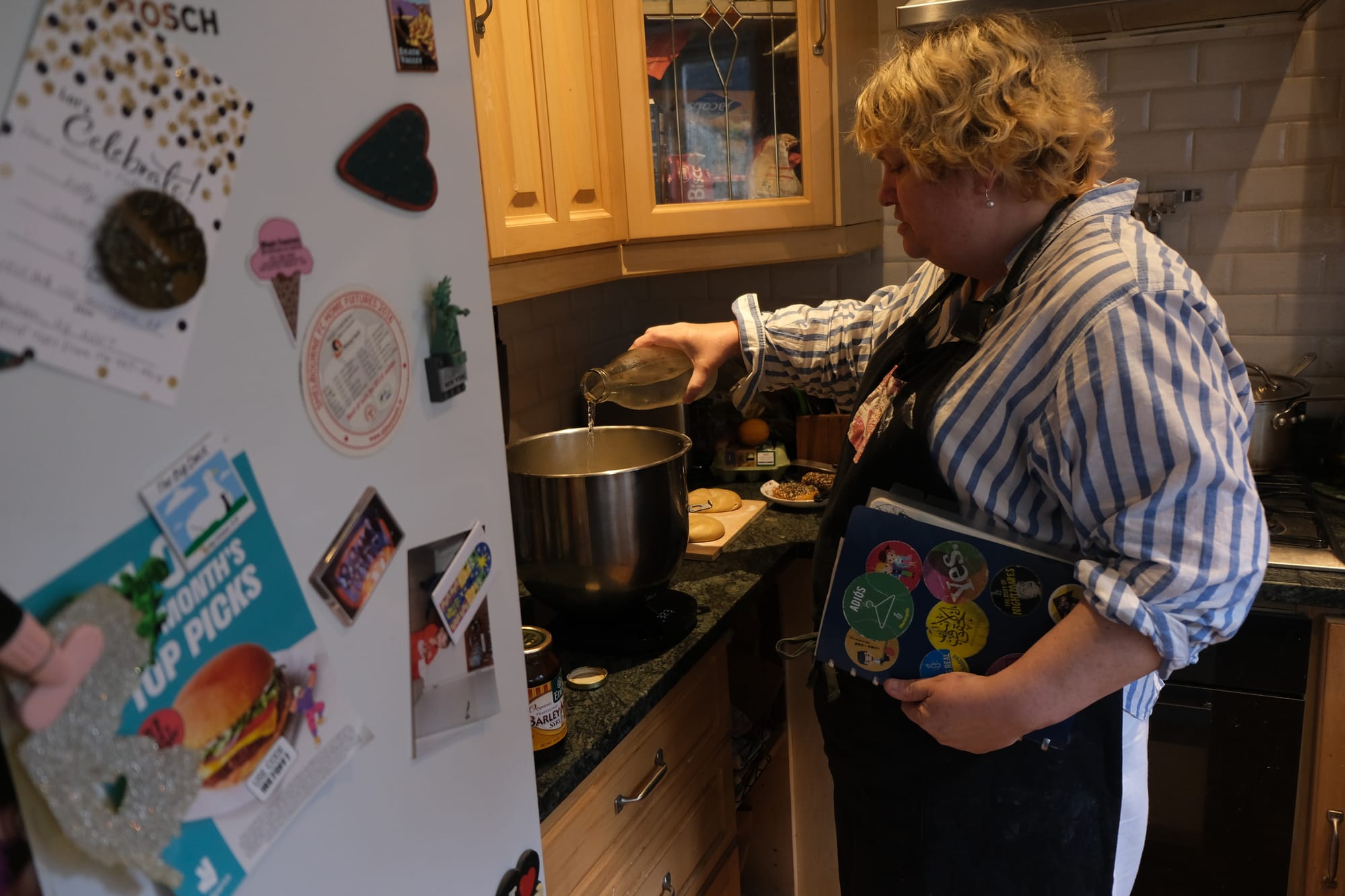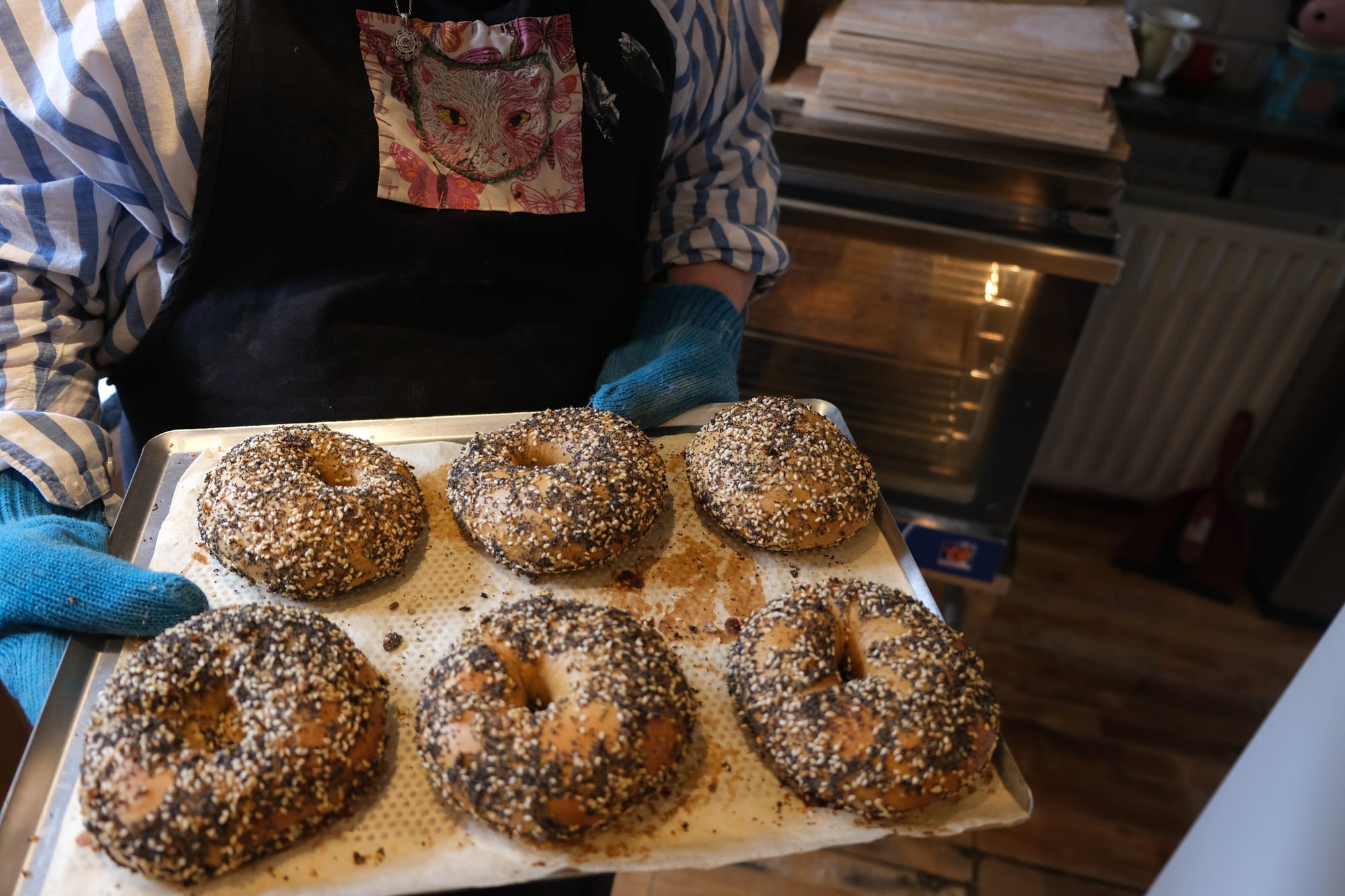What’s the best way to tell area residents about plans for a new asylum shelter nearby?
The government should tell communities directly about plans for new asylum shelters, some activists and politicians say.
“I make bagels because I wanted bagels,” says Kieran Clifford, of FatBaby Bakes.

Kieran Clifford runs her operations from home, a little cottage by the Liffey overlooking Dublin Port, in Ringsend.
“You cannot get a decent bagel for love or money on the entire island of Ireland anywhere,” said the ex-activism manager turned baker, on Saturday 9 June.
Not, that is, until she started up.
“I make bagels because I wanted bagels,” she says. “I missed them, but people like them. So I figured, why not?”
Her kitchen feeds her family during the day and turns into a microbakery at night. On that Saturday, it smelt sweet and malty.
Minutes earlier, she had filled her biggest pot with water and added a generous spoonful of malt syrup. She placed the pot on her biggest burner, bringing it to boil.
She opened her three tubs of seasoning – sesame, poppy, and everything – and tipped them out onto plates.
She placed a cooling rack on her sink and turned on her industrial oven.
Clifford’s bagel outlet goes by FatBaby Bakes on Instagram.
“Fat Baby is a family nickname. It’s a term of endearment,” she says. “If you saw my baby pictures, you would understand why I’m called that. It wasn’t so much that I was fat as it was that I had a giant head.”
A New Yorker, she has lived in Dublin for 25 years.
The move came at an odd age, she says. “I think I was 34 when I left. Most people would have been getting married, settling down and having kids but not me. I just picked up and moved countries,” she said.
In September 1999, when she moved, Clifford, who had an undergraduate degree in business and finance, had just spent eight years in Washington DC.
“I started out waiting tables like most people, and then I worked for a couple of different NGOs, then I did some volunteer work,” she says.
The Irish Republican Army announced a ceasefire in 1994. Clifford came over to Ireland with a human rights delegation to document violations by the British military in the north and wrote a report.
That led to an unexpected opportunity.

Someone from the organisation she had represented rang her and said something along the lines of, Sinn Féin is opening an office in Washington and they need a staffer like you, who knows the Hill and the ins and outs of DC.
She interviewed for that job and got it.
The time was formative, she says. “I can’t even describe what an impact it had on me, on my development, as a human being, on my view of the world and my understanding of how things work in the world.”
By the time she was finished though, she says, she was “fried”.
She went back to her studies, which she had paused years before. Her Irish studies master’s degree required a semester in Dublin.
“And when I got here, I was like, cool. I can breathe. I’m not going back,” she said.
In Dublin, she worked for Tar Isteach, which works with republican ex-prisoners, and Amnesty International Ireland.
She spent 20 years doing what she thinks was good work, she says. “A teeny-tiny contribution in the grand scheme of things to making the world a better place.”
It was intense, she says. And eventually, she needed a break.
She had spotted a baking traineeship years before. Now, circumstances were different.
She had paid off her house. Her son was set up at university. “My monthly nut to crack was quite manageable. ‘I’m gonna try something new and see what comes up,’” she remembers thinking.
She enrolled in the programme from October 2022 through March 2023. After, she headed back to New York to work in a bagel place for the summer.
“That was grueling,” she says. “Standing in front of a 225 degree oven when it’s 35 degrees out. Oh, it’s brutal. We worked 12-hour shifts, three in the morning, till three in the afternoon.”
Clifford’s microbakery extends from her kitchen to her living room.
Bookshelves and art materials coexist with a bagel-designated fridge, a rack and little wheeled table where she works her dough.
The stylish space serves as a multifunctional room where dinner can be served, visitors can sit down and get a cup of tea, or bagels can be shaped.
When talking about bagels, she has a clear vision. Beautiful, round and chewy, she says, as she grabs pieces of dough, stretching them long, wrapping one by one around her hand and then squishing them into a ring.
She delicately picks up the shaped bagels, puts them on two floured boards, six on each, and into the fridge.
As a child in southeast Long Island, Clifford and her siblings would be taken to mass every Sunday, she says. After mass, the big treat, if they behaved, was Dunkin’ Donuts.
As they grew older, doughnuts were replaced by bagels. Somebody would go to the bagel place and get a brown bag with a dozen and a tub of cream cheese.
The walls of her living room are decorated with artworks, but the mantel is filled with family pictures.
“Baking has so many fond associations for me as a child because it was one of the most joyful things I did as a child with my mother,” she says.
She grabs two trays of overnight proofed bagels and brings them into the kitchen for boiling and baking.
“Bagels are really simple, it’s flour, cold water, barley malt syrup and salt,” she says as she drops three bagels into the boiling pot of water. “That’s it.”

These days, Clifford usually mixes, weighs, and shapes her bagels on Friday mornings. They go on boards and into the fridge for at least 12 hours.
Then at 3am on Saturday mornings, she boils and bakes the bagels, then drives them to be sold at the Rialto house of Gerry Godley, otherwise known as BreadMan Walking.
They met last year, but only recently started working together. He told her she had to push the bagels, she says, and called her “the bagel Queen”.
Godley says the first time he tasted them, they felt familiar. “I think they’re lovely and the fact that she is New Yorker, she has a personal connection to what she’s making […] gives them a really lovely human context.”
BreadMan Walking, another microbakery, runs on Saturdays from 12pm to 3pm in Godley’s home kitchen.
“We rarely think about the person who made the food we’re about to eat,” he says. But in his bakery, the human connection is very present.
“That’s at the heart of it – the crazy idea of opening your house every Saturday and letting anyone walk in to buy some food,” he adds, smiling.
Clifford says she finds it energising and joyful. She has now also opened pre-orders for Sunday collection at her home in Ringsend.
“The things I miss from home are the Sunday New York Times in print, bagels, and New York pizza,” she says.
“But after rolling dozens of bagels every single day until I got it right, I can confidently say that my bagels are good,” she says. “They are legitimate, authentic New York bagels made in Dublin.”
Get our latest headlines in one of them, and recommendations for things to do in Dublin in the other.